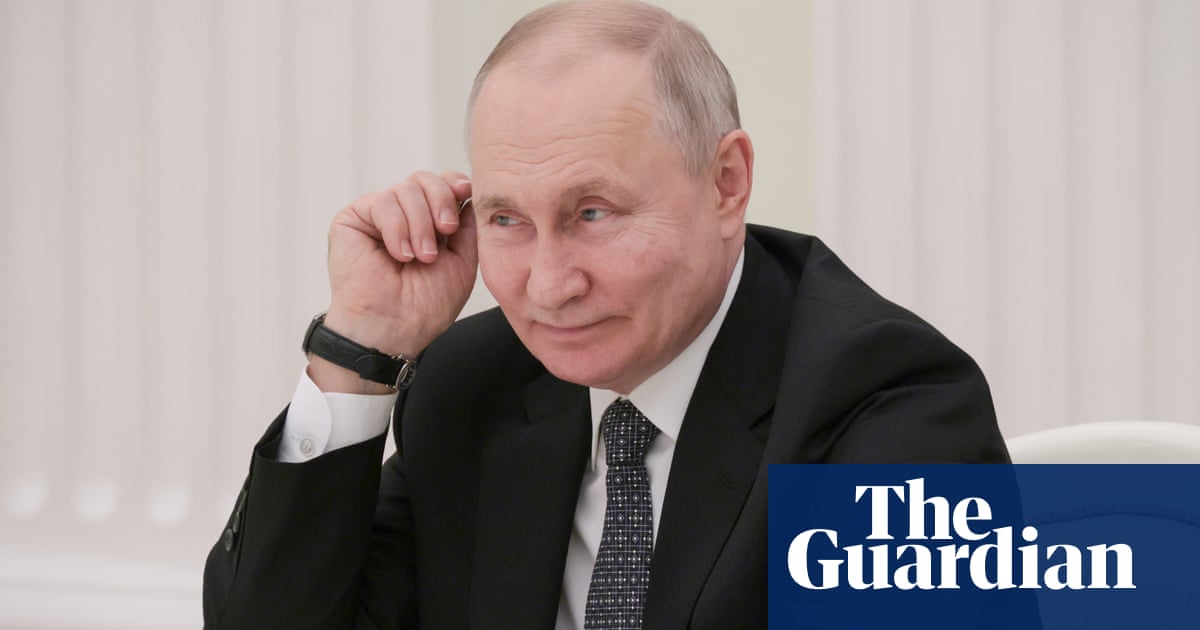
After a destructive feud between his top military chiefs and the mercenary warlord Yevgeny Prigozhin, Vladimir Putin has appeared to side with his top brass, calling for Russia’s “volunteer detachments” fighting in Ukraine to be placed under the direct control of the defence ministry.
The decision severely undermines Prigozhin, who has turned Wagner’s role in the capture of Bakhmut into an outsized public profile in Russia that he uses to berate Putin’s generals and promote himself.
Speaking to a group of pro-war bloggers on Tuesday, the Russian president said he welcomed the defence minister Sergei Shoigu’s initiative to force mercenary groups to sign contracts with the ministry – an order Prigozhin has refused to follow.
“This has to be done and it has to be done as quickly as possible,” Putin said of the military contracts, saying it was “in line with common sense, with established practice and the law”.
Earlier, Shoigu had ordered all volunteer detachments to sign contracts with his ministry by the end of the month, a step seen as an attempt to rein in Prigozhin by integrating Wagner into the army.
“Wagner will not sign any contracts with Shoigu,” Prigozhin said in response, criticising Shoigu for failing to “properly manage military formations”.
When asked to comment on Putin’s statements on Wednesday, a defiant Prigozhin doubled down. “When we started participating in this war, no one said that we would be obliged to conclude agreements with the Ministry of Defence,” he said in a rare direct rebuke of the president.
“None of the Wagner fighters is ready to go down the path of shame again. And so no one will sign contracts,” he said, adding that he believed the Russian president would find a “compromise” for Wagner.
The feud between Prigozhin and the military reached new heights this month when a Russian commander accused Wagner of kidnapping and torturing his soldiers.
Putin’s intervention is seen as a big boost for Shoigu, a longtime ally of the president who has faced political pressure for Moscow’s faltering efforts in Ukraine. It has also put Prigozhin in his most precarious position since the invasion began.
“Shoigu has Prigozhin in more or less a checkmate. If Wagner does not sign a [defence ministry] contract in a few weeks, the state could have grounds to stop supporting Wagner, or even make legal moves against them,” said Dara Massicot, a senior policy researcher at the Rand Corporation.
Some analysts suggested that Putin probably made the decision to limit Wagner’s influence in Ukraine months earlier.
“The decision was made in January, but they were waiting for Wagner to take Bakhmut,” said Tatyana Stanovaya, the founder of the political analysis firm R Politik. “It was decided that at least on Ukraine’s territory, everyone should be subjugated to the general staff.”
Prigozhin announced earlier this month that his troops had largely pulled back from Bakhmut, most of which they captured after taking heavy casualties.
Prigozhin’s exclusion from Ukraine would sideline one of Russia’s most recognisable war figures. Through the daily use of social media, he has cultivated a populist, anti-elite persona that has resonated with Russians unhappy with the foundering invasion.
The warlord’s public standing peaked as his troops gradually captured Bakhmut, delivering Moscow its first tangible military victory since last summer.
“Prigozhin understands that his publicity is his protection,” said a former defence official who worked with him. “He has no official status, but he knows that Putin prefers stability and wouldn’t want to cause chaos by letting others go after such a public figure.”
With his troubles mounting, Prigozhin embarked on a publicity tour across Russia, addressing audiences alongside hardliners such as the ex-arms dealer Viktor Bout.
Questions remain about whether he can maintain his standing through a publicity tour alone.
“I don’t think that it will have the same effect as his battle for Bakhmut,” said Stanovaya. “Prigozhin is pushed into a corner a bit and is trying to figure out how to realise his goals.”
The mercenary boss has continued his public attacks against Russia’s military leadership. Speaking in the central Ulyanovsk region on Tuesday, he directly contradicted Putin, who claimed earlier that day that Kyiv’s counteroffensive had failed on all fronts.
“They [Ukraine] are fighting correctly,” Prigozhin said, claiming that Moscow was not doing enough to “counter the adversary”.
Still, some believe it is too soon to speculate about Prigozhin’s downfall.
“People have wrongly written off Prigozhin many times,” said the former defence official. “Shoigu currently has the upper hand, but if Ukraine’s counteroffensive fails, Prigozhin will likely be called upon again,” they added, saying that Putin traditionally played off different factions against one another.
The former official also noted that Putin hinted on Tuesday that some of Prigozhin’s criticism of the military was justified. “At the start of the special military operation, we quickly realised that the ‘carpet generals’ […] are not effective, to put it mildly,” Putin said. “People started to come out of the shadows who we hadn’t heard or seen before, and they turned out to be very effective and made themselves useful.”
Prigozhin’s future could depend on the success or failure of Ukraine’s counteroffensive, Stanovaya argued. “He’s waiting for them to see that without his abilities and skills, the Russian army will lose territory and Putin or Shoigu will come to him for help … He dreams about that.”
"control" - Google News
June 15, 2023 at 12:28AM
https://ift.tt/dEJhCsf
Putin sides with military chiefs over placing Wagner under direct control - The Guardian
"control" - Google News
https://ift.tt/wZIDhCi
https://ift.tt/7uXQS0f
Bagikan Berita Ini














0 Response to "Putin sides with military chiefs over placing Wagner under direct control - The Guardian"
Post a Comment